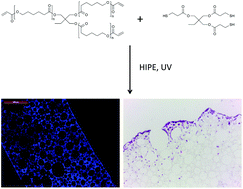Fully biodegradable and biocompatible emulsion templated polymer scaffolds by thiol-acrylate polymerization of polycaprolactone macromonomers†
Abstract
The emulsion templating process offers a route to highly porous polymers with well-defined morphologies. This study describes the preparation of such porous polymers (polyHIPEs) via the photopolymerization of a multi-functional thiol and polycaprolactone macromonomer. The resulting materials have nominal porosities of 90% and 95%, and are seen to have an interconnected pore morphology, with an average pore diameter of approximately 60 μm. Initial biocompatibility assessments with fibroblast cells (L929) have shown that the polymers are capable of supporting cell growth over 7 days and degradation products are non-toxic to cells up to a concentration of 0.1 mg ml−1.

- This article is part of the themed collection: David Sherrington Commemorative Issue

 Please wait while we load your content...
Please wait while we load your content...